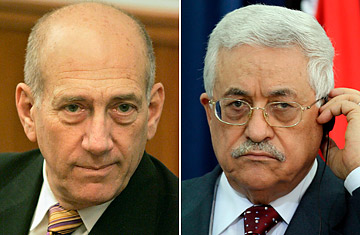
Israeli Prime Minister Ehud Olmert, left, and Palestinian President Mahmoud Abbas
The difference now is that the Bush Administration, with just 18 months left in office, is in dire need of some policy victories in the Middle East. In particular, it must show its Arab allies, such as Saudi Arabia — whose help Washington needs to stabilize Iraq — that the U.S. is willing to put its weight behind the peace process. But in looking to score points in the Middle East, Bush is likely to be as disappointed as his predecessors. That's because the core of his strategy to bolster moderate Arab states and moderate Palestinians while shunning the region's radicals is a case of too little too late. The sad reality is that the moderates of the Arab world have little to offer Israel and less and less power to promote peace in the Middle East.
Under the new Bush plans, Israel would begin peace talks with the Palestinians on the condition that the Palestinian Authority (PA) crack down on terrorism and corruption. This is understandable but unrealistic. The Fatah leadership that has controlled the PA since the 1993 Oslo Accords has been unable or unwilling to curb Palestinian militants. A key reason terrorist acts continue is that many Palestinians simply don't see the benefits of giving up armed struggle. With no end in sight to the growth of Israelis settlements and security barriers in the occupied West Bank, most Palestinians have lost faith in the ability of Fatah's notoriously corrupt leadership to lead them to the promised land of a Palestinian state, and have instead put their trust in Fatah's rival, the puritanical militants of Hamas.
Even though Hamas is the democratically elected representative of the Palestinian people, Bush's plans continue to embrace Fatah's failed leaders, and to exclude Hamas from the proposed peace talks. So whatever agreements the peace negotiations produce are unlikely to have any legitimacy on the ground. And while the Bush Administration is doing what it can to bolster the legitimacy of Palestinian President Mahmoud Abbas (the head of Fatah), this could also backfire. The $190 million package of U.S. aid Bush proposes to send to the Palestinians includes money to bolster Fatah-controlled security services — effectively arming Fatah thugs to fight Hamas thugs. This is a recipe for renewed Palestinian civil war, not nationhood. And if Hamas' recent victory over Fatah in Gaza is any guide, it's a civil war that America's allies might not win.
Just as Bush would exclude Hamas from Palestinian-Israeli peace talks, his call for a regional peace conference notably excludes countries that are hostile to Israel, especially Syria and Iran. A peace conference that doesn't involve enemies sitting down across from each other isn't much of a peace conference. The countries that might show up, such as Saudi Arabia, don't border Israel and have never fired a shot in anger at the Jewish state. (The Saudis just try to ignore Israel.) The Bush Administration merely wants these countries to take some initial steps toward recognizing Israel, such as sending heavyweight cabinet-level ministers to the meetings. But many of America's Arab allies are autocratic regimes whose populations are becoming increasingly anti-American and anti-Israeli, thanks to the American invasion of Iraq and the Israeli occupation of Palestinian territories. These governments are unlikely to make substantial gestures toward Israel without significant progress toward a Palestinian state, lest they incur the growing wrath of their fast-radicalizing subjects.
The reality is Israel's safety will never be assured, and a Palestinian state will never be secured until the U.S. and Israel begin some level of cooperation with their enemies, or until they defeat them. And if dealing with the devil seems naïve and impractical, it's worth remembering that victory in the Middle East is just as elusive as peace.
